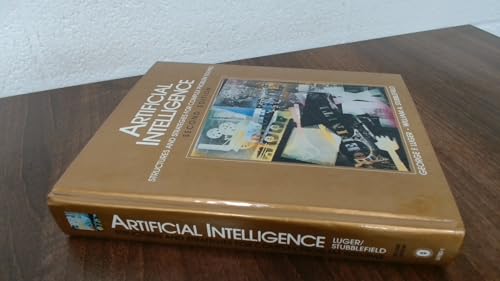Written by a leading international consultant in AI, this book delivers a balanced and comprehensive introduction to both the principles and practical applications of Artificial Intelligence. The discussion of AI theory and development is richly illustrated with AI solutions presented in three languages--CLOS, LISP, and PROLOG.
Shelving category: Artificial intelligence
Artificial Intelligence
Structures and Strategies for Complex Problem Solving
Fourth Edition
George Luger
Artificial intelligence (AI) began as the quest to create machines that could think for themselves and (perhaps) out-think humans: the holy grail of computing! Over the years, while still exploring the mechanisms that enable thought, AI has evolved into a more pragmatic discipline. AI uses different strategies to solve the complex practical problems that present themselves wherever computing technology is applied. And intelligence itself is now known to be too complex to be described by any single theory - instead, a constellation of theories characterize the subject from different levels of abstraction. At the lowest levels, neural networks, genetic algorithms and other forms of computation aid understanding of adaptation, perception, embodiment, and interaction with the physical world. On a more abstract level, designers of expert systems, intelligent agents, stochastic models, and natural language understanding programs reflect the role of knowledge and social processes in creating, transmitting and sustaining knowledge. Further, logicians propose deduction, abduction, induction, truth-maintenance, and other models and modes for reasoning.
In this fourth edition, George Luger touches on all these levels of structures and strategies for complex problem solving, as well as conveying excitement for the study of intelligence itself. He shows how to use many different software tools and techniques for addressing the complex problems that challenge the modern computer scientist.
The trademark features of this best-selling text are:
· a thorough and balanced treatment of the foundations of AI;
· the combination of theoretical foundations of intelligent problem solving with the data structures and algorithms needed for implementation;
· example programs written in LISP and PROLOG;
· putting practical applications of AI into context; and
· a unique discussion of the social and philosophical issues of AI.
In addition, this thoroughly updated fourth edition includes:
· the incorporation of more "agent-based" problem solving;
· new material on reinforcement learning;
· improved chapters on Bayesian based inference techniques, including belief networks;
· model-based reasoning and planning examples from the NASA space program;
· updated material on Natural Language Processing; and
· comments on the AI endeavor from the perspectives of philosophy, psychology and neuro-physiology.
Artificial Intelligence: Structures and Strategies for Complex Problem Solving is ideal for a one or two semester university course on AI, as well as an invaluable reference for researchers in the field or practitioners wishing to understand and employ the power of current AI techniques in their work.
George Luger received his PhD from the University of Pennsylvania in 1973. He spent the next five years as a Postdoctoral Research Fellow at the Department of Artificial Intelligence of the University of Edinburgh. He is currently a Professor of Computer Science, Linguistics, and Psychology at the University of New Mexico in Albuquerque. His research interests, courses information, and current papers may be found at: http://www.cs.unm.edu/~luger/
![]()
